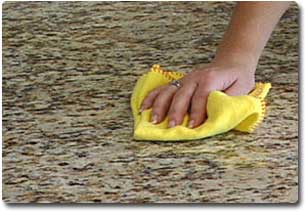Common Countertop Edge Options
What to do when a spill occurs
No matter how careful you are, spills are going to happen. A quick response and the right solutions can keep spills from damaging your stone or the sealer. StoneTech Professional recommends that you only use the cleaning products  recommended in this care guide.
recommended in this care guide.
Etch Marks – Substances that are highly acidic, such as orange juice, coffee, vinegar, wine, tomato products, mustard and many soft drinks, will “etch” most marble, limestone and travertine – whether the stone is sealed or unsealed. Although sealing allows you time to wipe up a spill, it cannot stop the chemical reaction that may leave a dull area or etch mark in the stone. In addition, cleaners not specifically designed for natural stone are not recommended. These may etch away the polish, discolor the surface, scratch the stone or degrade the sealer. That’s why selecting the correct cleaning products is so important to the lifetime beauty of your natural stone. Professional refinishing is the best way to permanently remove etch marks and restore your natural stone’s even finish.
Food Spills – Scoop up the food with a plastic spoon. Blot with dry, white cloth. Spray the area with Revitalizer. Wipe dry with a clean cloth.
Liquid Spills – Blot away the excess with a clean, dry white cloth; turning the cloth frequently. Spray the area with Revitalizer. Wipe dry with a clean cloth. SGranite Mud – Let the mud stain dry completely. Remove dried mud with a soft plastic or nylon brush. Spray affected area with Revitalizer. Wipe dry with a clean cloth. If the stain remains, contact a professional cleaner. Oily Stains – If you identify the stain as having an oil base (from foods like salad and cooking oils, butter, or some cosmetics) you may be able to remove the stain using a poultice. We recommend StoneTech Professional Extract Oil Stain Removal Paste. This easy-to-use poultice is designed to slowly remove oily stains from natural stone surfaces. Follow the directions on the label.



